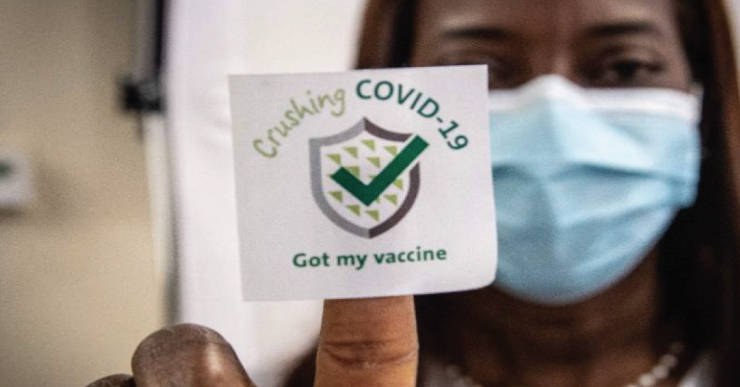Frontline News, Edition 34
September 21, 2021

NATION MEETS ANOTHER VACCINE MILESTONE

State and Federal officials see the danger posed by the Delta variant and recent full FDA approval for the Pfizer vaccine as two factors contributing to the uptick.
Unfortunately, there are some regional variations with vaccination rates lagging in the south and parts of the west. These areas are also where the Delta variant is surging.
Of the 1199 regions, Massachusetts has the highest rate of vaccination with at 76 percent of residents having received at least a first vaccine dose. Seventy percent of New Jersey’s population has taken at least one shot, followed closely by Maryland, New York, and Washington DC. Finally, 64 percent of Florida’s residents have taken at least one shot.
RECENT STUDY SHOWS THE DANGER OF DELTA VARIANT AND BENEFITS OF VACCINATION
As more people become fully vaccinated at the same time that the Delta variant is surging, there is much concern about “breakthrough infections”—infections that occur among those who have taken the vaccine.
A recent study from California found that vaccines are still by far the best way to protect against serious illnesses and, along with some basic precautions, the pathway to getting back to normal interactions.
Researchers looked at COVID-19 data from May through July as Delta variant cases began to grow.
Among other things, the researchers found:
The Delta variant led to an increase in breakthrough infections, but the rate of hospitalization among the vaccinated was 1 per 100,000 people compared to over 29 per 100,000 among the unvaccinated.
The rate of infection among unvaccinated people is ve time the rate of vaccinated people.
Older vaccinated people were most vulnerable to serious illness after a breakthrough infection. The middle age of vaccinated people who were hospitalized for COVID-19 was 64 years. Among unvaccinated people who were hospitalized, the middle age was 49.
The Delta variant poses the most severe risk to the unvaccinated, but even the vaccinated need to be cautious. Fortunately, the evidence is also clear that the vaccine plus some basic precautions can protect us in most cases. The Center for Disease Control and Prevention recommends wearing masks in indoor public spaces. Outdoor spaces are safer, but we should wear masks if we think we don’t know whether the people around us are vaccinated.
BIDEN ADMINISTRATION UPDATES COVID-19 MYTHS AND FACTS
The Federal Center for Disease Control and Prevention (CDC) is continuously updating its list of myths and facts about the COVID-19 vaccine as vaccine myths spread on social media and contribute to many people’s hesitancy towards the vaccine. Here are a couple of myths that have become prominent on social media.
Do COVID-19 vaccines contain microchips?
No. Covid-19 vaccines do not contain microchips. Vaccines are developed to fight against disease and are not administered to track your movement. Vaccines work by stimulating your immune system to produce antibodies, exactly like it would if you were exposed to the disease. After getting vaccinated, you develop immunity to that disease, without having to get the disease first.
Will a COVID-19 vaccine alter my DNA?
No. Covid-19 vaccines do not change or interact with your DNA in any way. Both mRNA and viral vector COVID-19 vaccines deliver instructions (genetic material) to our cells to start building protection against the virus that causes COVID-19. However, the material never enters the nucleus of the cell, which is where our DNA is kept.
Can being near someone who received a COVID-19 vaccine affect my menstrual cycle?
No. Your menstrual cycle cannot be affected by being near someone who received a COVID-19 vaccine. Many things can affect menstrual cycles, including stress, changes in your schedule, problems with sleep, and changes in diet or exercise. Infections may also affect menstrual cycles.

